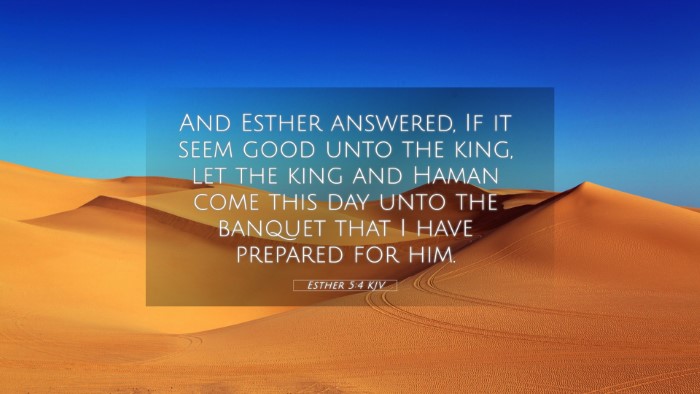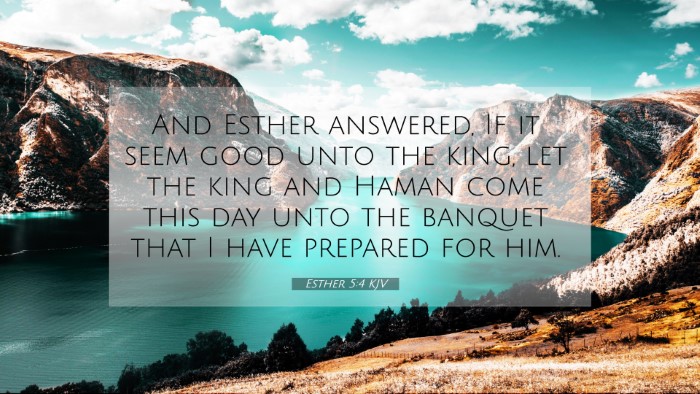Old Testament
Genesis Exodus Leviticus Numbers Deuteronomy Joshua Judges Ruth 1 Samuel 2 Samuel 1 Kings 2 Kings 1 Chronicles 2 Chronicles Ezra Nehemiah Esther Job Psalms Proverbs Ecclesiastes Song of Solomon Isaiah Jeremiah Lamentations Ezekiel Daniel Hosea Joel Amos Obadiah Jonah Micah Nahum Habakkuk Zephaniah Haggai Zechariah MalachiEsther 5:4 Similar Verses
Esther 5:4 Cross References
And Esther answered, If it seem good unto the king, let the king and Haman come this day unto the banquet that I have prepared for him.
Uncover the Rich Themes and Topics of This Bible Verse
Listed below are the Bible themes associated with Esther 5:4. We invite you to explore each theme to gain deeper insights into the Scriptures.
Esther 5:4 Cross Reference Verses
This section features a detailed cross-reference designed to enrich your understanding of the Scriptures. Below, you will find carefully selected verses that echo the themes and teachings related to Esther 5:4 KJV. Click on any image to explore detailed analyses of related Bible verses and uncover deeper theological insights.

Esther 5:8 (KJV) »
If I have found favour in the sight of the king, and if it please the king to grant my petition, and to perform my request, let the king and Haman come to the banquet that I shall prepare for them, and I will do to morrow as the king hath said.

Genesis 27:25 (KJV) »
And he said, Bring it near to me, and I will eat of my son's venison, that my soul may bless thee. And he brought it near to him, and he did eat: and he brought him wine and he drank.
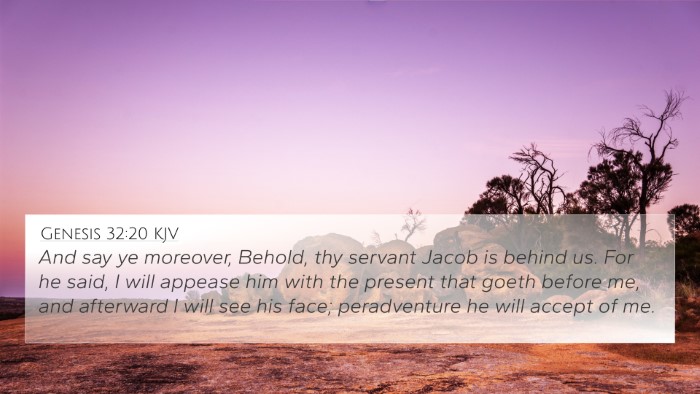
Genesis 32:20 (KJV) »
And say ye moreover, Behold, thy servant Jacob is behind us. For he said, I will appease him with the present that goeth before me, and afterward I will see his face; peradventure he will accept of me.
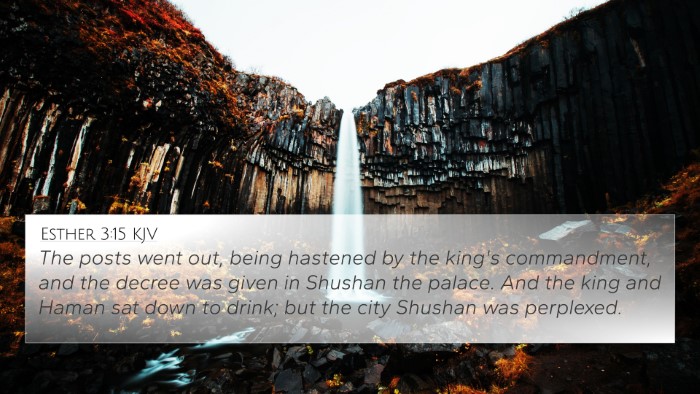
Esther 3:15 (KJV) »
The posts went out, being hastened by the king's commandment, and the decree was given in Shushan the palace. And the king and Haman sat down to drink; but the city Shushan was perplexed.

Psalms 112:5 (KJV) »
A good man sheweth favour, and lendeth: he will guide his affairs with discretion.
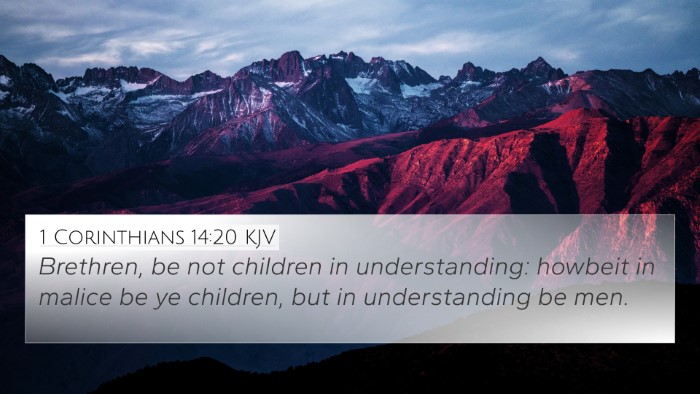
1 Corinthians 14:20 (KJV) »
Brethren, be not children in understanding: howbeit in malice be ye children, but in understanding be men.
Esther 5:4 Verse Analysis and Similar Verses
Understanding Esther 5:4
Esther 5:4 states: "And Esther answered, If it seem good unto the king, let the king and Haman come this day unto the banquet that I have prepared for him."
Contextual Background
The Book of Esther is set during the time of the Persian Empire, where Esther, a Jewish woman, becomes queen. This verse occurs when Esther courageously approaches King Ahasuerus to reveal her plan to save her people from destruction orchestrated by Haman.
Verse Meaning
The response of Esther in this verse indicates her strategic approach in dealing with the king and Haman. Several commentaries provide insight into its significance:
- Matthew Henry: Henry emphasizes Esther's wisdom in choosing a banquet to garner favor and create an atmosphere conducive to her mission. The act of inviting the king and Haman signifies her cleverness in dealing with impending danger.
- Albert Barnes: Barnes highlights the importance of Esther’s hospitality which plays a crucial role in her strategy. Such an invitation reflects her understanding of royal customs and her desire to win the king’s favor before revealing her true intentions.
- Adam Clarke: Clarke notes the underlying tension of Esther's situation, stressing her cautious approach. The banquet serves as a prelude to revealing the plot against her people, indicating her faith and reliance on divine guidance.
Thematic Connections
Esther 5:4 is pivotal for understanding themes such as courage, strategy, and the divine provision. Several related scriptures expand on these themes:
- Esther 4:14 - This verse underscores Esther's role in the deliverance of the Jews, indicating that her position as queen was divinely orchestrated for such a time.
- Proverbs 21:1 - Highlights how the heart of the king is in the hand of the Lord, reinforcing the idea that God guides the outcomes directed by human leaders.
- Matthew 10:16 - Jesus instructs His followers to be wise as serpents and innocent as doves, paralleling Esther's need for wisdom and discernment in her approach.
- James 1:5 - Encourages asking for wisdom from God, connecting to Esther's implicit faith that God would guide her in her crucial decisions.
- Luke 14:10 - Instructs one to be humble and to allow others to elevate them, depicting Esther’s humility in her approach to the king.
- 1 Timothy 2:1-2 - Highlights the importance of praying for leaders, a practice that mirrors the prayers for divine intervention in Esther's time.
- Philippians 4:6-7 - Emphasizes presenting requests to God in prayer, which resonates with Esther’s reliance on prayer as she prepares for the banquet.
Cross-Referencing Insights
This verse can further be analyzed in relation to the following themes and connections between Biblical texts:
- Courage and Divine Purpose: Drawing parallels between Esther's boldness to approach the king and other Biblical figures such as Moses in Exodus 3:11-12.
- Strategy in Leadership: Examining how leaders in the Bible navigate challenges (e.g., Nehemiah 2:5) can provide insights valuable for modern leadership.
- Gathering Allies: Connecting Esther's banquet to Jesus' Last Supper (Matthew 26:26-30) illustrates the importance of meal gatherings in building rapport for pivotal discussions.
Applications for Today
Understanding Esther 5:4 invites reflection on how we should approach difficult situations in our lives:
- Seek wisdom through prayer: Just as Esther took time to prepare, we too should seek divine wisdom in our decisions.
- Be strategic and observant: Look at the context of your challenges and employ sound judgment in approaching them.
- Understand the power of hospitality: Building relationships can open doors for significant discussions, as shown in Esther's invitation.
Conclusion
Esther 5:4 serves as a powerful reminder of the necessity of wisdom, strategy, and divine dependence in the face of adversity. Its exploration through multiple commentaries reveals layers of meaning that provide valuable insights for both historical context and modern application.

